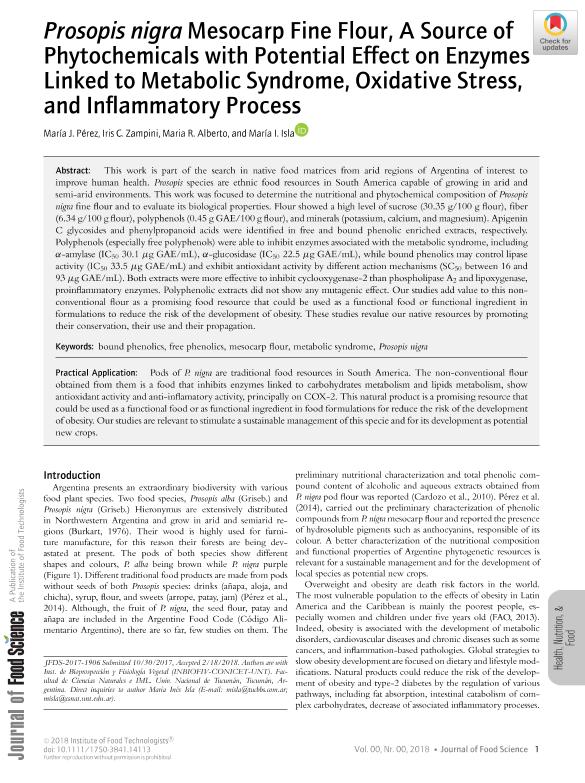Artículo
Prosopis nigra mesocarp fine flour, A source of phytochemicals with potential effect on enzymes linked to metabolic syndrome, oxidative stress, and inflammatory process
Fecha de publicación:
05/2018
Editorial:
Wiley Blackwell Publishing, Inc
Revista:
Journal of Food Science
ISSN:
0022-1147
Idioma:
Inglés
Tipo de recurso:
Artículo publicado
Clasificación temática:
Resumen
This work is part of the search in native food matrices from arid regions of Argentina of interest to improve human health. Prosopis species are ethnic food resources in South America capable of growing in arid and semi-arid environments. This work was focused to determine the nutritional and phytochemical composition of Prosopis nigra fine flour and to evaluate its biological properties. Flour showed a high level of sucrose (30.35 g/100 g flour), fiber (6.34 g/100 g flour), polyphenols (0.45 g GAE/100 g flour), and minerals (potassium, calcium, and magnesium). Apigenin C glycosides and phenylpropanoid acids were identified in free and bound phenolic enriched extracts, respectively. Polyphenols (especially free polyphenols) were able to inhibit enzymes associated with the metabolic syndrome, including α-amylase (IC50 30.1 μg GAE/mL), α-glucosidase (IC50 22.5 μg GAE/mL), while bound phenolics may control lipase activity (IC50 33.5 μg GAE/mL) and exhibit antioxidant activity by different action mechanisms (SC50 between 16 and 93 μg GAE/mL). Both extracts were more effective to inhibit cyclooxygenase-2 than phospholipase A2 and lipoxygenase, proinflammatory enzymes. Polyphenolic extracts did not show any mutagenic effect. Our studies add value to this non-conventional flour as a promising food resource that could be used as a functional food or functional ingredient in formulations to reduce the risk of the development of obesity. These studies revalue our native resources by promoting their conservation, their use and their propagation. Practical Application: Pods of P. nigra are traditional food resources in South America. The non-conventional flour obtained from them is a food that inhibits enzymes linked to carbohydrates metabolism and lipids metabolism, show antioxidant activity and anti-inflamatory activity, principally on COX-2. This natural product is a promising resource that could be used as a functional food or as functional ingredient in food formulations for reduce the risk of the development of obesity. Our studies are relevant to stimulate a sustainable management of this specie and for its development as potential new crops.
Archivos asociados
Licencia
Identificadores
Colecciones
Articulos(INBIOFAL)
Articulos de INSTITUTO DE BIOTECNOLOGÍA FARMACEUTICA Y ALIMENTARIA
Articulos de INSTITUTO DE BIOTECNOLOGÍA FARMACEUTICA Y ALIMENTARIA
Articulos(INQUINOA)
Articulos de INST.DE QUIMICA DEL NOROESTE
Articulos de INST.DE QUIMICA DEL NOROESTE
Citación
Perez, Maria Jorgelina; Zampini, Iris Catiana; Alberto, Maria Rosa; Isla, Maria Ines; Prosopis nigra mesocarp fine flour, A source of phytochemicals with potential effect on enzymes linked to metabolic syndrome, oxidative stress, and inflammatory process; Wiley Blackwell Publishing, Inc; Journal of Food Science; 83; 5; 5-2018; 1454-1462
Compartir
Altmétricas




